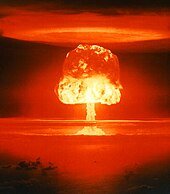On January 31, 1950, President Harry S. Truman made a historic announcement that would have far-reaching consequences for the world. In response to the Soviet Union’s successful testing of an atomic bomb, Truman declared that the United States would develop an even more powerful weapon – the hydrogen bomb. This decision marked a significant escalation in the arms race and intensified the already tense Cold War between the two superpowers.
The development of the hydrogen bomb, also known as the H-bomb, represented a major technological advancement in nuclear weaponry. While the atomic bombs dropped on Hiroshima and Nagasaki during World War II were devastating, the H-bomb had the potential to be significantly more destructive. It utilized the process of nuclear fusion, which involved the fusion of hydrogen atoms to release an enormous amount of energy.
Truman’s announcement came at a time when the world was still reeling from the horrors of the atomic bombings in Japan. The devastating impact of those bombings had raised concerns about the potential for even deadlier weapons. The Soviet Union’s successful atomic bomb tests further heightened these fears and prompted the United States to take action.
The decision to develop the H-bomb was not made lightly. Truman and his advisors were aware of the ethical and moral implications of such a weapon. The destructive power of the hydrogen bomb was unparalleled, and its use could potentially lead to catastrophic consequences. However, the United States felt compelled to maintain its position as a global superpower and ensure its national security in the face of Soviet advancements.
The announcement of the H-bomb development sent shockwaves throughout the international community. The Soviet Union, already engaged in a fierce rivalry with the United States, saw this as a direct challenge to its own nuclear capabilities. The arms race between the two superpowers reached new heights as they competed to develop and stockpile more advanced and destructive weapons.
While the development of the H-bomb was met with enthusiasm by some who saw it as a necessary deterrent against the Soviet Union, it also sparked widespread protests and condemnation. Many feared that the pursuit of such powerful weapons would only increase the likelihood of a global nuclear conflict. The devastating potential of the H-bomb raised concerns about the future of humanity and the very survival of civilization.
The announcement by Truman also had significant geopolitical implications. It further strained relations between the United States and the Soviet Union, leading to an increase in tensions and a deepening of the Cold War. The arms race that followed the H-bomb development consumed vast resources and diverted attention away from other pressing issues, both domestically and internationally.
Despite the controversy surrounding the H-bomb, the United States successfully tested its first hydrogen bomb in 1952. This test, codenamed “Ivy Mike,” demonstrated the destructive power of the weapon and solidified the United States’ position as a nuclear superpower. The Soviet Union followed suit and successfully tested its own hydrogen bomb in 1953.
The development of the H-bomb had a lasting impact on global politics and the arms race. It ushered in an era of unprecedented destructive power and raised the stakes in the Cold War. The United States and the Soviet Union continued to build up their nuclear arsenals, each striving to outdo the other in terms of technological advancements and destructive capabilities.
In conclusion, Truman’s announcement of the H-bomb development in 1950 marked a pivotal moment in history. It intensified the arms race between the United States and the Soviet Union, pushing the boundaries of nuclear weaponry into thermonuclear territory. The development of the H-bomb had profound geopolitical implications and raised concerns about the future of humanity. It serves as a stark reminder of the destructive power of nuclear weapons and the need for international cooperation to prevent their use.
SEO Excerpt: On January 31, 1950, President Harry S. Truman announced the United States’ decision to develop the hydrogen bomb, escalating the arms race during the Cold War. This article explores the historical context, significance, and consequences of Truman’s announcement, highlighting the impact it had on global politics and the arms race between the United States and the Soviet Union.

